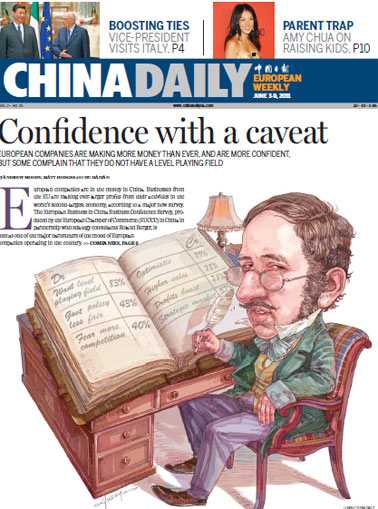Time to play the naming game
Updated: 2011-06-03 10:58
By David Bartram (China Daily European Weekly)
 |
|
Birmingham's player Curtis Davies. Chinese sportswear maker Xtep signed a five-year, 8.1 million euro sponsorship deal with Birmingham City FC last year. Provided to China Daily |
Chinese businesses look beyond football at home to associate themselves with Europe's powerhouses
Despite the immense popularity of football across China, the two have not enjoyed the most prosperous relationship in recent years. With the domestic game dogged by corruption and the national team failing to qualify for the past two World Cups, the football pitch is one of the few areas in which the country is not considered a rising power.
Yet Chinese businesses are beginning to find new opportunities within the sport - by associating themselves with Europe's football powerhouses.
"Our exposure through the English Premier League has really helped to grow our brand," says Terry Ho, executive director and CFO of Xtep, a Chinese sportswear company. Xtep became the first Chinese sportswear brand to appear in the Premier League when it agreed a five-year, 8.1 million euro sponsorship deal with Birmingham City FC in 2010.
"The audience that we are addressing is really a worldwide one. When we look at Chinese football nowadays, unfortunately it's not a very successful league. So, therefore, we are looking for a more mature football league, like those in Europe."
To appear alongside the likes of Nike and adidas in the English Premier League might be considered quite a coup for Xtep - which was launched as a sportswear brand in 2002. But given the company's remarkable growth in recent years - it now runs more than 7,000 outlets across China - that becomes less surprising.
"Having this kind of foreign exposure encourages Chinese customers to choose our product over rivals," Ho says. "We charge roughly the same amount for our products, but the brand makes people feel they are getting good value for money. We are increasing brand equity rather than raising selling prices."
Xtep is not the only Chinese sportswear manufacturer looking toward Europe to add equity to its brand. Li-Ning continues to push its name in Spain, recently agreeing a sponsorship deal with Sevilla. It reportedly substantially outbid Spanish rival Joma for the rights and now provides kits for three top-flight Spanish clubs.
Despite Li-Ning's worldwide outlook, there is a sense that international sponsorship deals are as important domestically as they are internationally. The company has changed strategy in recent years, taking on the major international brands head to head rather than offering a cheaper alternative. Despite some successes, the company continues to lag Nike in the Chinese sportswear market.
It undoubtedly takes deep pockets to challenge the US and European sportswear giants in an industry almost as volatile as professional sports itself. While endorsements of major sports teams are seen as essential, they come with inherent risks.
In May, less than 18 months since Xtep announced their five-year partnership with Birmingham City, the team was relegated from the Premier League - which is watched by hundreds of millions of fans across the globe - to the Championship, a league with little appeal outside of the United Kingdom.
"It is unfortunate, but this is the nature of football," says Ho, who must be hoping the club bounce back next season. He would have been more heartened by the club's Carling Cup victory, their first major trophy in almost 50 years.
"It was a once in a lifetime victory, which was a big bonus to us. And of course next year they will play in the Europa League against other famous European teams."
If Ho was disappointed to see Birmingham drop out of the Premier League, at least he will not feel the effects as badly as Carson Yeung, the Hong Kong businessman who bought the club in 2009 for about 90 million euros.
That Yeung became the first Chinese owner of a Premier League club is perhaps a surprise, given that England's top clubs are now owned by a gaggle of Russian oligarchs, US businessmen and Emirati royalty.
Last summer, China Investment Corporation (CIC), the country's sovereign wealth fund, was strongly linked with a bid for Liverpool FC, perhaps the most popular team across China. The move never materialized and the club was eventually sold to a new US owner.
Why the CIC did not complete the takeover of Liverpool has been the subject of much debate. It is possible the fund had doubts over the commercial viability of owning a football club, especially when in direct competition with billionaire owners more concerned with the success of their club than balancing the books.
But while China does not own one of Europe's elite football clubs, links continue to grow. Earlier this year, solar energy giant Yingli Green Energy announced a three-year partnership with Germany's Bayern Munich, one of the continent's most successful teams.
Yingli was evidently buoyed by the success of its sponsorship efforts during the 2010 World Cup in South Africa, where it took a high-profile position alongside established global brands such as Visa and Sony. Some even went as far as to suggest the company's attention-grabbing advertising helped Yingli secure the 36 billion yuan (3.89 billion euros) development loan it received from China Development Bank shortly after the tournament.
"Our mission is to provide affordable green energy to everyone," says Jason Liu, vice-president of Yingli.
"By becoming an official partner of Bayern Munich, we hope to become closer to our end customers. We believe that this is the right step to take to welcome solar energy's new era."
In many respects it seems an odd partnership, far detached from the traditional staples of sports sponsorship: food, drink, gambling and sportswear companies. But it does reflect the widespread global appeal of football. And for a company like Yingli, looking to expand worldwide, it can be a powerful avenue to tap into.
"We are continually seeking opportunities in other European countries," Xtep's Ho says. His company fronts the new generation of Chinese companies undaunted by the prospect of advertising internationally.
"The response we have received from our sponsorship of Birmingham City has been tremendous and it continues to exceed expectations."
The success of Xtep's Birmingham Series of sportswear may even surprise the company's boss, Ding Shuibo, a firm believer in the value of purchasing failing brands to reverse their fortunes in the Chinese market. With a raft of orders for merchandise from Southeast Asia and the Middle East, it suggests the old maxim - if Chinese brands want to go global, they must buy global brands - may no longer hold true.
Top European football clubs are unlikely to argue. Seduced by the prospect of monetizing Chinese supporters, sponsorship deals with Chinese companies such as Xtep and Li-Ning are likely to become commonplace in the coming years.
"At present we only sponsor Birmingham, but it's possible that in the future, once everything has matured and terms and conditions have been agreed, we will make further announcements," Ho says. "We will definitely sponsor more European teams in the future."
E-paper

Tapping into the future
Foreign companies are investing in China's water industry as many predict a growing profit margin.
Preview of the coming issue
Headhunters ride on growth
Commercial property rides wave
Specials

Cuisine central
London's Chinatown is helping diners appreciate full palate of Chinese food

Tying the knot
Danish couple's high-end macrame export business takes off in the mountains of Yunnan.

Truly a super woman
Li Yuchun first came to prominence in 2005 as the Super Girl winner, and since then has become an international star.
